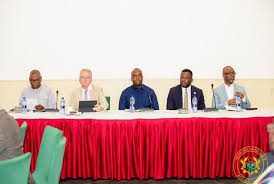
Ghana is stepping up reforms in its gold sector as the country prepares for a critical international assessment of its anti-money laundering and counter-terrorism financing measures.
At a high-level stakeholder meeting in Accra, Deputy Finance Minister Thomas Nyarko Ampem, speaking on behalf of Finance Minister Cassiel Ato Forson, warned that Ghana risks being placed on the Financial Action Task Force (FATF) grey list if it fails to meet international standards.
He stressed that reforms in the gold industry are crucial ahead of the second Anti-Money Laundering/Combating the Financing of Terrorism (AML/CFT) mutual evaluation by the Intergovernmental Action Group against Money Laundering in West Africa (GIABA).
“ Our collective responsibility is to ensure that today’s dialogue translates into concrete progress ,” Ampem said. He added that “ the implementation of this agenda will protect national revenues, preserve livelihoods and strengthen Ghana’s international reputation as a responsible gold hub .”
Ghana’s gold sector, which accounted for 64% of total exports in the first half of 2025 and contributes roughly 7% to the country’s GDP, faces scrutiny over illegal mining and large-scale smuggling.
A SwissAid report highlighted that more than 229 tonnes of gold, valued at over $11.4 billion, were illegally exported from Ghana between 2019 and 2023, including nearly 60 tonnes in 2022, second only to Mali in Africa.
The deputy minister called for a coordinated response from financial institutions, regulators, and law enforcement agencies to develop a joint action plan.
He commended the Financial Intelligence Centre (FIC) for conducting the recent National Risk Assessment and acknowledged support from the UK-Ghana Gold Programme and the Economic and Organised Crime Office (EOCO) in enhancing financial investigation capacity.
Keith McMahon, Deputy High Commissioner of the United Kingdom to Ghana, reaffirmed British support for the country’s gold sector reforms.
“ The UK strongly supports Ghana in its efforts to strengthen transparency and governance in the gold sector.
This is essential not only for the Ghanaian economy, but also for global financial integrity ,” he said.
The GIABA mutual evaluation is scheduled for next year, making the coming months critical for Ghana to demonstrate concrete progress in curbing illicit activities and reinforcing the credibility of its gold industry on the global stage.



